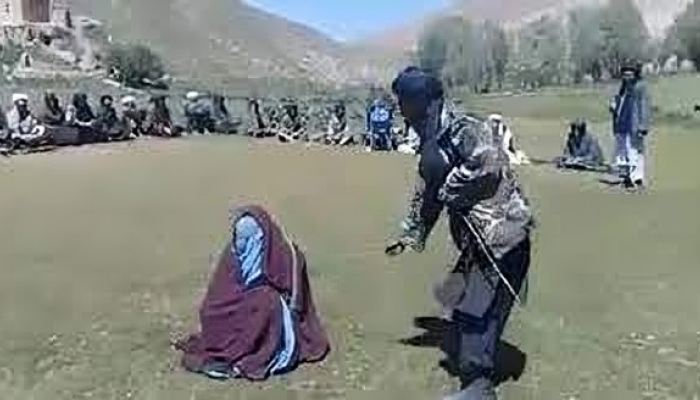RASC News Agency: The Taliban’s so-called Supreme Court announced on Thursday, September 11, that it had carried out public floggings against 16 people, including one woman, in Kabul and Balkh provinces. The victims were accused of drug-related offenses and “illicit relations,” charges that critics say are routinely manipulated by the regime to justify acts of humiliation and repression.
In Kabul, Taliban judges sentenced 14 men accused of selling or smuggling narcotic pills such as Zykob and Tablet-Ka to between 20 and 39 lashes in public squares, in addition to prison terms ranging from ten months to three and a half years. These punishments were conducted before crowds that included Taliban fighters and officials, turning justice into little more than a spectacle of violence.
In Balkh, Taliban authorities paraded a woman and a man before local residents and subjected them to public flogging on accusations of “illicit relations.” No further details were provided, but under Taliban dogma, any contact between an unrelated man and woman whether a phone call, a conversation, or a private meeting is criminalized. Such interpretations not only strip citizens of basic dignity but also eliminate the very possibility of private life in Afghanistan.
The latest wave of corporal punishment follows an earlier case this week in Laghman province, where a man and woman were whipped on charges of “moral corruption” and “fleeing home.” According to local sources, in just the past week alone at least 31 people, including six women, have been subjected to public flogging by the Taliban across Afghanistan.
International human rights organizations have repeatedly condemned the Taliban’s reliance on public flogging, branding it cruel, degrading, and in direct violation of international law. The United Nations and advocacy groups have urged the regime to abolish corporal punishment and adhere to due process standards. Yet the Taliban remain defiant, calling these punishments “Islamic obligations” and pledging to continue them despite mounting global outrage.
Critics stress that Taliban courts are neither independent nor credible. Trials are often held in secret, without legal counsel, and verdicts are dictated by ideology rather than evidence. What the Taliban call “justice” is, in practice, a machinery of intimidation designed to terrorize communities into obedience. Ordinary citizens report that fear of flogging has become a permanent feature of daily life, silencing dissent and driving Afghanistani society into deeper despair.
Legal analysts argue that these medieval punishments highlight the regime’s determination to govern through fear rather than law. By weaponizing religion to legitimize cruelty, the Taliban have turned Afghanistan’s judicial system into an instrument of repression where accountability, fairness, and the rights of the accused are absent. Instead, the courtroom has been transformed into a stage for ritualized violence, where the goal is not justice but domination.
For many Afghanistanis, these spectacles revive the darkest memories of the Taliban’s first rule in the 1990s, when public squares became arenas of punishment and collective fear replaced civic life. Today, as then, the victims are not only those who are whipped in public, but an entire society forced to endure humiliation under a regime that mistakes brutality for authority.






